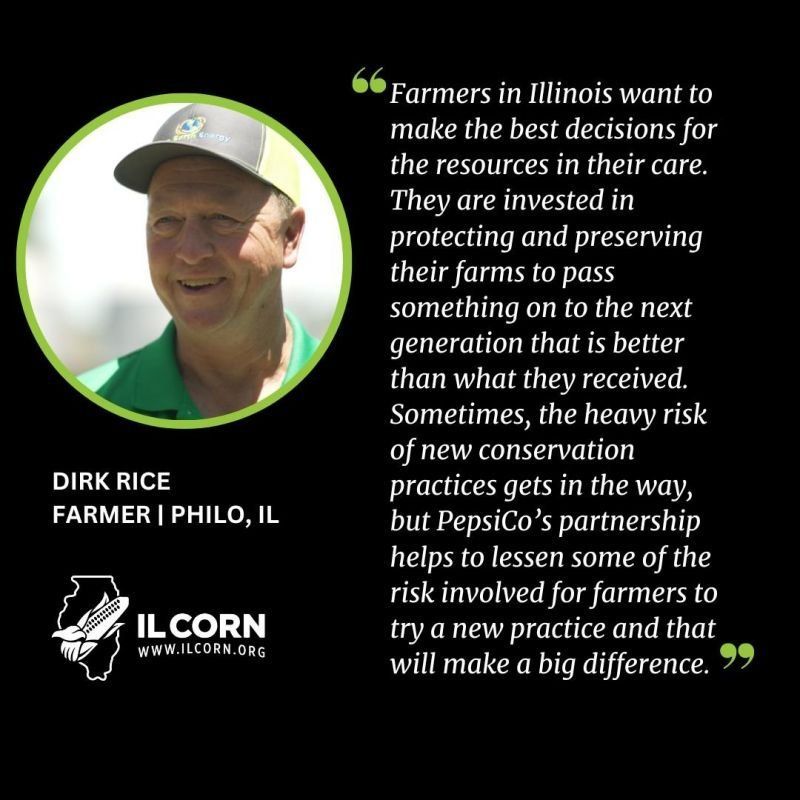PepsiCo Announces $216 Million Investment in Long-term Partnerships with Three Major Farmer-facing Organizations to Support Regenerative Agriculture Transformation on More than Three Million Acres of

Practical Farmers of Iowa, Soil and Water Outcomes Fund, and the Illinois Corn Growers Association partner with PepsiCo to drive adoption of regenerative agriculture practices and reduce carbon emissions
PURCHASE, N.Y. (March 21, 2023) – Yesterday, PepsiCo announced a $216 million multi-year investment in long-term, strategic partnership agreements with three of the most well-respected farmer-facing organizations – Practical Farmers of Iowa (PFI), Soil and Water Outcomes Fund (SWOF), and the IL Corn Growers Association (ICGA) – to drive adoption of regenerative agriculture practices across the United States. The combined impact of these three strategic partnerships is expected to support the accelerated uptake of regenerative practices on more than three million acres and deliver approximately three million metric tons of greenhouse gas (GHG) emission reductions and removals by 2030.
PepsiCo will work alongside these trusted organizations to establish and scale financial, agronomic, and social programs that enable the transition to regenerative agriculture practices through education, upfront investment in outcomes, peer coaching and networking, and cost-sharing.
Driven by PepsiCo Positive (pep+), the company’s strategic, end-to-end business transformation, PepsiCo’s strategic investment in PFI, SWOF and ICGA is essential to supporting the U.S. farming community as it makes changes that aim to secure production volumes and mitigate the impacts of climate change, while still cultivating quality, bountiful crops to feed the world’s growing population.
“As the climate crisis continues to escalate, the threat to our food system increases as well,” said Jim Andrew, Chief Sustainability Officer, PepsiCo. “It’s critically important to partner, for the long term, with organizations that have earned the trust of farmers as they make the transition to adopt climate-smart agriculture practices. We intend to be shoulder-to-shoulder with farmers as they work to make soil healthier, sequester carbon, improve watershed health and biodiversity, and improve their livelihoods.”
Through these partnerships, by 2030, PepsiCo will work with PFI to reach approximately 1.5 million acres; SWOF to reach nearly 1 million acres; and the ICGA to reach approximately 600,000 acres. Based on progress to date, these collaborative efforts are expected to deliver more than 500,000 regenerative acres by the end of 2023.
"We are excited to expand our partnership with PepsiCo and farmers in its supply chain to support the adoption of regenerative agriculture practices that have measurable impacts on soil health, the environment, and farm sustainability," said Adam Kiel, managing director of the Soil and Water Outcomes Fund. "By providing high-quality and customized agronomic assistance to farmers implementing new practices we help them reduce emissions and nutrient loss, unlock a new revenue stream, and increase the value of their farmland for current and future generations."
“PFI farmers have known for years that a supply chain that encourages farmers to grow only a couple of crops is not sustainable – it’s not diverse or resilient enough for our changing world,” said Sally Worley, Executive Director, Practical Farmers of Iowa. "The PFI model is proven – when we plug farmers into our powerful network and connect them with a peer network, educational resources, funding and technical support, they’re able to build more resilient farms. We’re excited to continue partnering with PepsiCo and look forward to working together to create a more diversified and resilient agriculture.”
“Farmers in Illinois want to make the best decisions for the resources in their care. They are invested in protecting and preserving their farms to pass something on to the next generation that is better than what they received. Sometimes, the heavy risk of new conservation practices gets in the way, but PepsiCo’s partnership helps to lessen some of the risk involved for farmers to try a new practice and that will make a big difference,” said Dirk Rice, Philo, IL farmer and member of ICGA.
As the largest food and beverage company in North America, and second largest globally, a resilient food system is essential to PepsiCo’s business and its ability to meet its ambitious pep+ targets which include driving the adoption of regenerative agriculture practices across 7 million acres – approximately the size of PepsiCo’s agricultural footprint – by 2030 and achieving net-zero emissions by 2040.
For more information about PepsiCo’s commitment to positive agriculture, please click here.







